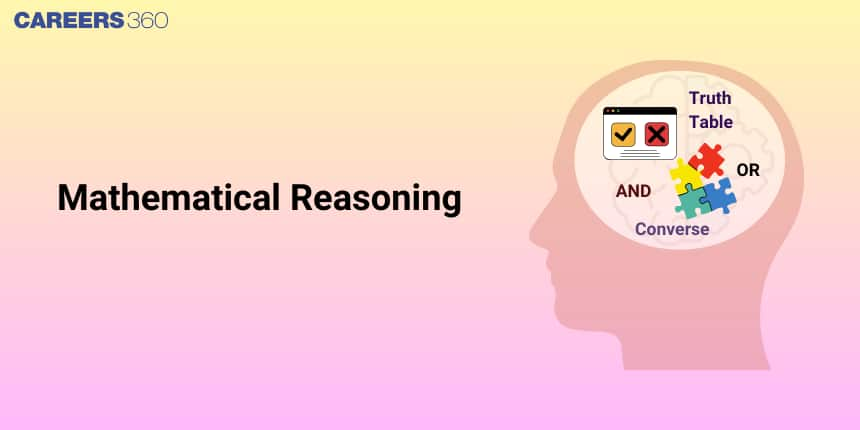Mathematical Reasoning
Mathematical reasoning is the logical thought process used to analyze, deduce, and infer properties, structures, and patterns within mathematical frameworks. At its core, mathematical reasoning revolves around mathematical statements, which form the building blocks of any logical discourse in mathematics. Understanding the nature and classification of these statements is crucial for rigorous mathematical thinking.
JEE Main: Study Materials | High Scoring Topics | Preparation Guide
JEE Main: Syllabus | Sample Papers | Mock Tests | PYQs
- Mathematical Reasoning
- Solved Examples Based on Mathematical Reasoning
- Summary

Mathematical Reasoning
A mathematical statement is the basic unit of any mathematical reasoning. A sentence is called a mathematical statement if it is either true or false but not both.
For example,
‘Mumbai is in India’ is a statement because it is true.
‘Two plus five equals ten’ is a statement because it is false.
‘All prime numbers are odd numbers’ is a statement because it is false.
'$x$ is a prime number' is NOT a mathematical statement as it can either be true or false depending on the value that the variable $x$ takes. Such statements are also called Open statements.
Note:
1. A true statement is also called Valid statement and a false statement is also called an Invalid statement.
2. A statement is always denoted by a small letter like $p$, $q$, $r$, etc. For example, if we denote the statement “Fire is always hot” by p, then this can also be written as
$p$ : "Fire is always hot".
3. A sentence is NOT a mathematical statement if
It is an exclamation
It is an order or request
It is a question
It involves variable time such as ‘today’, ‘tomorrow’, ‘yesterday’ etc.
It involves variable places such as ‘here’, ‘there’, ‘everywhere’ etc.
It involves pronouns such as ‘she’, ‘he’, ‘they’ etc.
Sentence Types | Function | Mathematical Statement | Example | Final Punctuation |
Declarative/Assertive | Statement: It tells us something | Yes | I like coffee. | ・ |
Interrogative | Question: It asks us something | No | Why does the sun shine? | ❓ |
Imperative | Command: It tells us to do something | No | Please shut the door to keep out the bugs. | ❗or ・ |
Exclamative | Exclamation: It expresses surprise | No | Wow, he just won a gold medal! | ❗ |
Recommended Video Based on Mathematical Reasoning
Solved Examples Based on Mathematical Reasoning
Example 1: Which one is an optative sentence ?
1) Let's go
2) What is your name ?
3) May your team win the match
4) Hey ! Don't touch my phone
Solution
Optative Sentence -
A sentence that expresses a wish.
(c) is a optative sentence as it expresses a wish
Example 2: Which of the following is NOT an imperative sentence ?
1) Please find my purse
2) Please shut the door
3) Hello they locked you in the room !
4) All of these are imperative
Solution
Imperative Sentence -
A sentence that expresses a request or a command
Example: Please give me a book.
Since "Hello they locked you in the room !" is exclamatory sentence, it is not an imperative sentence.
Example 3: Which of the following is not an exclamatory sentence ?
1) Thank you , Melissa !
2) I hate You !
3) Happy Birthday , Amy!
4) All of these are exclamatory sentences
Solution
Exclamatory Sentence -
A sentence that expresses some strong feelings.
Example: Yay! We won.
All are exclamatory sentences
Example 4: Which of the following is NOT an example of interrogative sentences ?
1) How are you doing ?
2) Have you ever been to Mumbai ?
3) How wonderful!
4) Both (a) and (b)
Solution
Interrogative Sentence -
A sentence that asks a question.
Example: Have you ever been to Paris?
(c) is an exclamatory sentences
So, option (3) is not an example of interrogative sentence.
Example 5: Which of the following is NOT a statement ?
1) the earth is a star
2) Every square is a rectangle
3) Physics is easy
4) All are statements
Solution
Statement -
An assertive sentence which is either true or false but not both simultaneously.
Example, The sun is a star.
Physics is easy is not a statement as it has different validation according to different people . And it is not always true or false.
So, option (3) is not a statement.
Summary
Mathematical reasoning, centered on the concept of mathematical statements, is a cornerstone of mathematical thought and communication. Whether establishing a proof, disproving a conjecture, or solving a problem, the ability to distinguish between true and false statements, understand open statements, and recognize non-mathematical sentences is fundamental. Mastery of these concepts not only aids in the study of mathematics but also enhances logical thinking and analytical skills that are valuable in various fields.
Frequently Asked Questions (FAQs)
A mathematical statement is the basic unit of any mathematical reasoning. A sentence is called a mathematical statement if it is either true or false but not both.
An assertive sentence is a sentence which defines a fact.
An interrogative sentence is a question used to ask something.
A sentence that expresses a request or a command is called an imperative sentence.
A exclamatory sentence expresses the strong feelings like joy, anger, excitement etc.
Also Read
15 Feb'25 10:09 AM
13 Feb'25 06:57 PM
12 Feb'25 01:24 AM
12 Feb'25 01:21 AM
12 Feb'25 01:19 AM
15 Oct'24 12:32 PM
15 Oct'24 12:05 PM